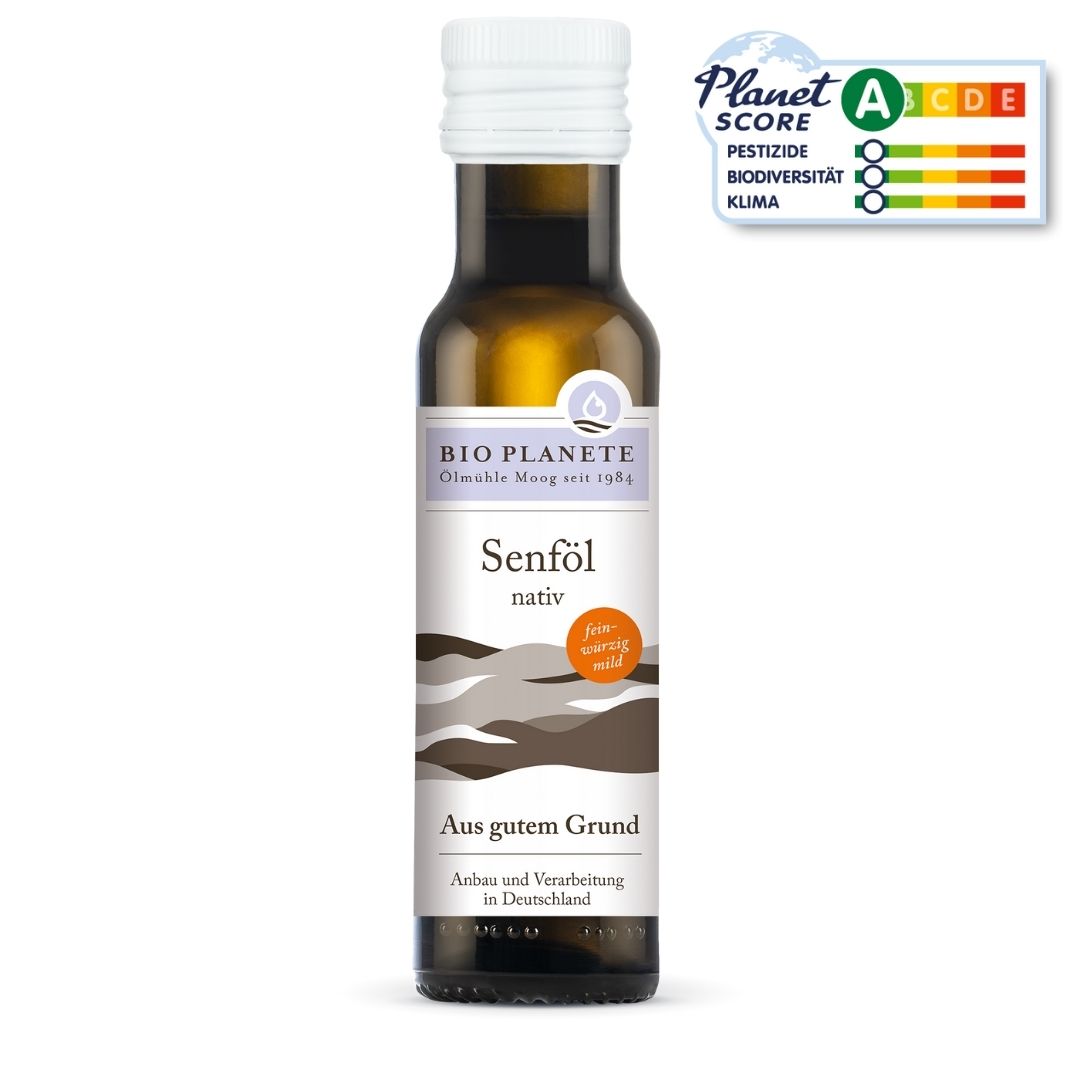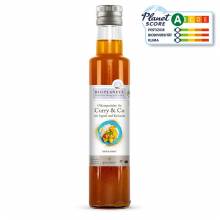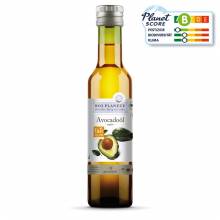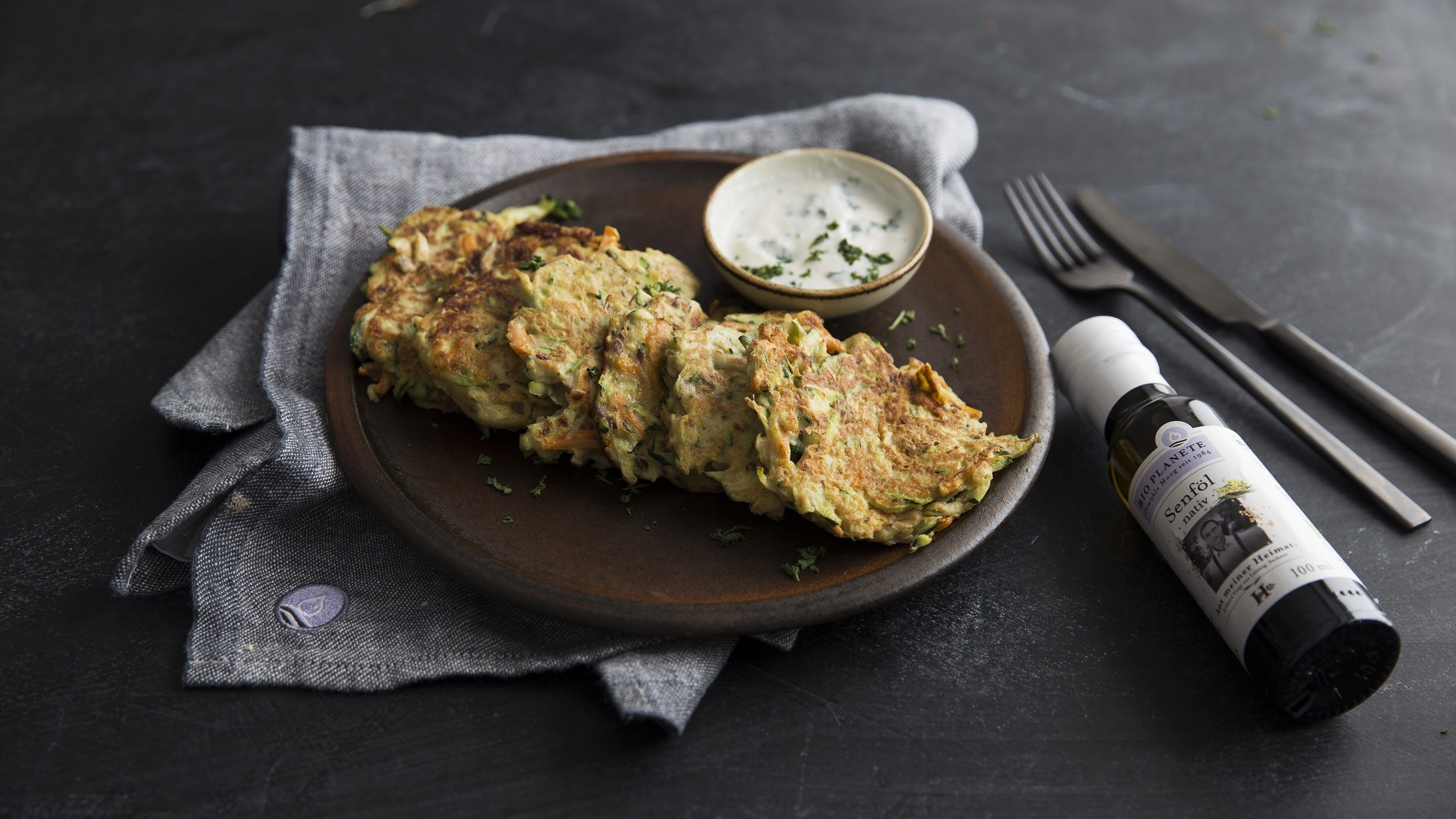
Mustard Oil
· Virgin ·
100 ml
Our farmers of organic mustard, such as oilseed producers Hans-Peter Wendt from Brandenburg (Germany) and Eckard Voigt from Saxony (Germany) are happy to be a part of our initiative “Together for more organic agriculture in Germany”. Under this designation, we only offer oils from regional agriculture. We want to build longterm partnerships with our regional contractual farmers and are very happy about the longterm cooperation with many organic farmers in Germany. However, due to the crop rotation that has to be implemented, our suppliers can vary slightly every year.
This oil is one of the first food products in Germany and France which has been rated with the Planet Score. For this eco-labelling, additional indicators are used alongside the life cycle assessment to better capture the environmental impact of food production. Read more about the Planet Score.
Ideas for recipes and use of Virgin Mustard Oil
The characteristic BIO PLANÈTE Mustard Oil has a mild taste and is not spicy, as one might think. The compounds that are responsible for the spicy taste of mustard seeds remain in the press cake due to their chemical properties and are not transferred into the oil. Organic Mustard Oil lends the hearty dishes (e.g. Vegan Courgette Pancakes) and sauces a delicious, fine spicy note.
Product of organic farming
Average nutritional values per 100 ml
** % of daily reference intake (adults)
On average in 100 ml: Alpha-linolenic acid (Omega 3): 12 g, Linoleic acid (Omega 6): 11 g
-
What does cold pressing mean?
"Cold pressing" assumes that no external heat is added. When we cold-press oils, the temperature is monitored and we ensure that no high temperatures are reached. We can therefore guarantee that the quality of the oil is not impaired.
-
What conditions and standards are behind the organic seal on our oils?
An organic seal is a quality and test seal with which products from organic farming are marked. In 2010, a binding new organic seal was introduced throughout the EU, also known as the EU organic logo, which identifies food from organic farming (a star-shaped leaf on a green background).
This seal replaced the German state organic seal (green hexagon with "BIO" lettering), which had existed since 2001, with the same standards in terms of content. Due to the high degree of popularity of its predecessor, both seals are still often used today.
The use of this certification is strictly regulated by the publisher and is subject to ecological requirements. Compliance with the criteria by producers is ensured by a documentation obligation as well as regular sampling and examination of product samples. Compliance with the regulations is monitored in Europe by the responsible Eco-Control bodies.
Foods labelled with the organic seal must, among other things:
• Not be produced by or with/from genetically modified organisms
• Not to be produced with the use of synthetic pesticides
• Contain no more than 5% conventionally produced components (in exceptional cases, if ingredients are not available in ecological quality, in accordance with Annex VO)
• not contain sweeteners and stabilisers as well as synthetic colourants, preservatives and flavour enhancers
• not result from monotonous crop rotations (two-, three- and four-field farming)
• and much more: more information on the EU Organic Label -
Can I use the oil even after the expiration date?
We can no longer guarantee the oil's perfect quality after its best before date.
In the interest of sustainability, however, we would like to point out the following: vegetable oils do not belong to the group of very sensitive foodstuffs and can usually still be consumed after the best-before date. This is especially true if the bottle is still sealed and it has been stored away from heat sources. Therefore, we recommend using your senses to test the oil before disposing of it. Oil that has been stored for too long can be easily recognized by smell and taste. If it tastes rancid or unusual (off), it should not be consumed. -
How do I remove the labels from the jars and bottles?
Since we use oil-soluble glue for the labels, the best way to remove the label from the coconut jars is with oil. Simply coat the label with oil, let it absorb overnight and peel off easily in the morning. However, if the label is already off and only the glue is on it, this method doesn't work as well. In this context, we have been told of positive experiences with orange oil cleaner, such as from AlmaWin or Sodasan. Another option is a hair dryer - because heat also loosens the label well.
Get more suggestions at Upcycling & Creative.






